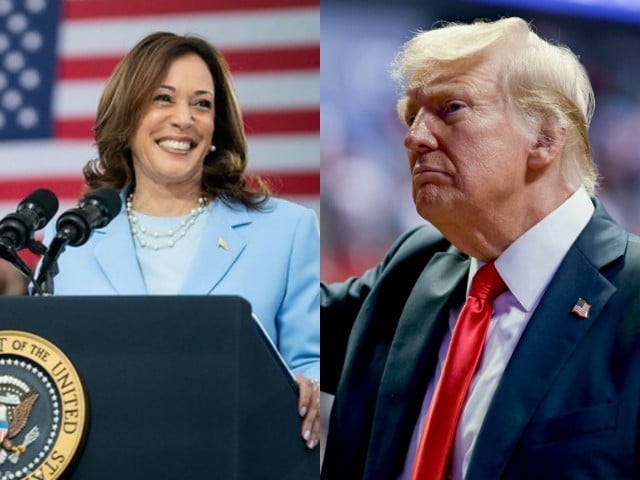CHICAGO:
The politically divisive White House race between Kamala Harris and Donald Trump has also highlighted a marked voting divergence between women and men, according to polling data and analysts.
Democrat Harris, who is of Black and South Asian descent, is vying to be the United States’s first woman president, while Trump is known for making comments denigrating women and is an advocate of restricting abortion rights.
In a CBS opinion poll released this week, 56 percent of women surveyed said they would vote for Harris, while 44 percent backed Trump, a Republican. Conversely, 54 percent of men surveyed backed Trump, while 45 percent said they would vote for Harris.
The figures from a recent Siena/New York Times poll are even more striking. Fifty-six percent of women voters back Harris, with only 35 percent supporting Trump.
In comparison, 52 percent of male voters said they prefer the Republican, with 39 percent backing the Democratic Party’s candidate, according to that poll.
On voting day, Trump “is going to find out the power of women in 2024,” said US President Joe Biden on Monday while backing his vice president, Harris.
Biden was referring to a 2022 Supreme Court decision — which Trump has publicly claimed credit for — that abolished the US federal right for women to seek abortions.
Women voters in the United States have skewed toward Democrats for years, but analysts say the gender division in this election is stark. “It’s not a gap, it’s a chasm,” said Frank Luntz, an influential pollster, on CNN recently. “We’ve never seen this before.”
Luntz went so far as to predict that “there are going to be divorces because of the battle between them.”
The analyst pointed in particular to Trump’s sustained strategy of launching personal attacks against Harris, including berating her appearance, her intelligence and even her laugh.
“Don’t insult your opponent for how they look, how they speak. Women can’t stand that,” he said, adding that women voters were looking for a candidate to focus on the future, not on “anger about the past.”
The Trump camp’s attacks on Harris appear to have had the unintended effect of galvanizing the Democratic base in some cases.
In July, Trump’s running mate JD Vance caused an uproar when a 2021 clip re-emerged of him naming Harris and others as “childless cat ladies” who had no “direct stake” in the country’s future.
“Masculinity is front and center in Donald Trump’s campaign,” said Sabrina Karim, an associate professor at Cornell University and director at the Gender and Security Sector Lab.
“He is constantly comparing himself to other men, describing how attractive and strong he is compared to other men and he often denigrates women, which are all key features of hyper-masculinity.”
Trump’s appeal, however, “is not limited to men,” said Sonia Gipson Rankin, a law professor at the University of New Mexico, adding that his campaign is built on a “focus on strength, dominance and traditional masculinity.”
“Many people across genders feel like these traits are being criticized or undervalued in today’s world, so when president Trump projects himself as a tough, no-nonsense leader, it resonates with them,” she said. Harris has homed in on Trump’s aggressive rhetoric in recent speeches.
“This campaign is about a recognition that, frankly, over the last several years, there’s been this kind of perversion that has taken place,” she said at a campaign event in Pennsylvania on Sunday.
“That the measure of the strength of a leader is based on who you beat down, when what we know is the real and true measure of the strength of a leader is based on who you lift up,” she said.
Fuelling the divide between men and women voters has been the evolving state of reproductive rights in the United States. Many conservative, Republican-run states have put in place bans or restrictions on abortion access in the wake of the Supreme Court decision.
But “while abortion is a major issue, candidates will need to address a variety of concerns and show how their policies connect with all voters” regardless of gender identity or other affiliations, said Rankin.
Harris’s campaign has so far steered clear of focusing on the fact that she could become the first woman president of the United States, in marked contrast to fellow Democrat Hillary Clinton’s messaging in 2016.
Regardless of who wins in November, however, analysts warn that the divergence in voting patterns along gender lines appears to be part of a deeper trend.
Karim, of Cornell University, noted some US polls indicate that young men and women appear to be moving in different political directions, creating deepening divisions within the same age group.
“This difference is different from previous generations,” she said.







